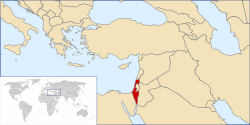An editor has nominated this article for deletion. You are welcome to participate in the deletion discussion , which will decide whether to keep it. |


The following is an alphabetical list of articles related to Israel .
An editor has nominated this article for deletion. You are welcome to participate in the deletion discussion , which will decide whether to keep it. |


The following is an alphabetical list of articles related to Israel .